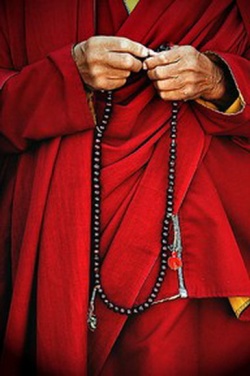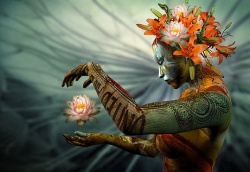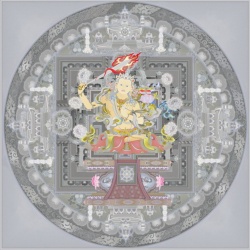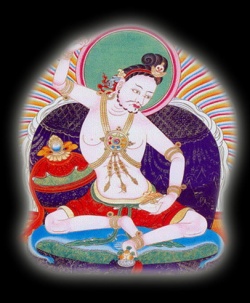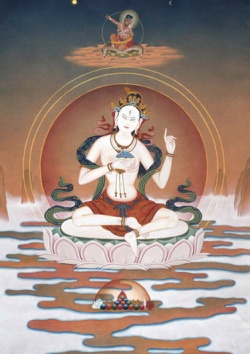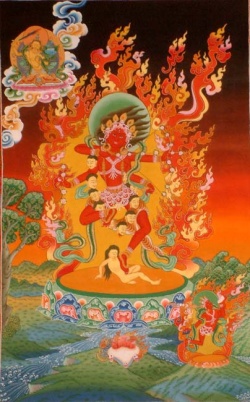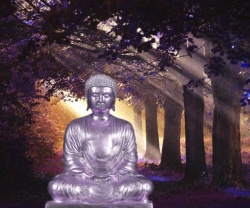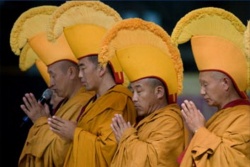The Gospel of Buddha:Chapter 10: Uruvela, the Place of Mortification
The Bodhisatta went in search of a better system
and came to a settlement of five bhikkhus
in the jungle of Uruvela;
and when the Blessed One saw the life of those five men,
virtuously keeping in check their senses,
subduing their passions, and practising austere self-discipline,
he admired their earnestness and joined their company. [1]
With holy zeal and a strong heart,
the Sakyamuni gave himself up to meditative thought
and rigorous mortification of the body.
Whereas the five bhikkhus were severe, the Sakyamuni was severer still,
and they revered him, their junior, as their master. [2]
So the Bodhisatta continued for six years
patiently torturing himself and suppressing the wants of nature.
He trained his body and exercised his mind
in the modes of the most regorous ascetic life.
At last, he ate each day one hemp-grain only,
seeking to cross the ocean of birth and death
and to arrive at the shore of deliverance. [3]
And when the Bodhisatta was ahungered,
lo! Mara, the Evil One, approached him and said:
"Thou art emanciated from fasts, and death is near.
What good is thy exertion?
Deign to live, and thou wilt be able to do good works."
But the Sakyamuni made reply:
"O thou friend of the indolent, thou wicked one;
for what purpose hast thou come?
Let the flesh waste away,
if but the mind becomes more tranquil
and attention more steadfast.
What is life in this world?
Death in battle is better to me
than that I should live defeated." [4]
And Mara withdrew, saying:
"For seven years I have followed the Blessed One step by step,
but I have found no fault in the Tathagata." [5]
The Bodhisatta was shrunken and attenuated,
and his body was like a withered branch;
but the fame of his holiness spread in the surrounding countries
and people came from great distances to see him
and receive his blessing. [6]
However, the Holy One was not satisfied.
Seeking true wisdom he did not find it,
and he came to the conclusion that mortification would not extinguish desire
nor afford enlightenment in ecstatic contemplation. [7]
Seated beneath a jambu-tree,
he considered the state of his mind
and the fruits of his mortification.
His body had become weaker,
nor had his fasts advanced him in his search for salvation,
and therefore when he saw that is was not the right path,
he proposed to abandon it. [8]
He went to bathe in the Neranyjaro river,
but when he strove to leave the water
he could not rise on account of his weakness.
Then espying the branch of a tree and taking hold of it,
he raised himself and left the stream.
But while returning to his abode,
he staggered and fell to the ground,
and the five bhikkhus thought he was dead. [9]
There was a chief herdsman living near the grove
whose eldest daughter was called Nanda;
and Nanda happened to pass by the spot where the Blessed One had swooned,
and bowing down before him she offered him rice-milk and he accepted the gift.
When he had partaken of the rice-milk all his limbs were refreshed,
his mind became clear agin,
and he was strong to receive the highest enlightenment. [10]
After this occurrence, the Bodhisatta again took some food.
His disciples, having witnessed the scene of Nanda
and observing the change in his mode of living, were filled with suspicion.
They were convinced that Siddhattha's religious zeal was flagging
and that he whom they had hitherto revered as their Master
had become oblivious of his high purpose. [11]
When the Bodhisatta saw the bhikkhus turning away from him,
he felt sorry for their lack of confidence,
and was aware of the loneliness in which he lived. [12]
Suppressing his grief he wandered on alone,
and his disciples said:
"Siddhattha leaves us to seek a more pleasant abode." [13]
Continue Reading
- The Gospel of Buddha: Preface
- The Gospel of Buddha:Chapter 01: Rejoice
- The Gospel of Buddha:Chapter 02: Samsara and Nirvana
- The Gospel of Buddha:Chapter 03: Truth the Saviour
- The Gospel of Buddha:Chapter 04: The Bodhisatta's Birth
- The Gospel of Buddha:Chapter 05: The Ties of Life
- The Gospel of Buddha:Chapter 06: The Three Woes
- The Gospel of Buddha:Chapter 07: The Bodhisatta's Renunciation
- The Gospel of Buddha:Chapter 08: King Bimbisara
- The Gospel of Buddha:Chapter 09: The Bodhisatta's Search
- The Gospel of Buddha:Chapter 10: Uruvela, the Place of Mortification
- The Gospel of Buddha:Chapter 11: Mara, the Evil One
- The Gospel of Buddha:Chapter 12: Enlightenment
- The Gospel of Buddha:Chapter 13: The First Converts
- The Gospel of Buddha:Chapter 14: Brahma's Request
- The Gospel of Buddha:Chapter 15: Upaka
- The Gospel of Buddha:Chapter 16: The Sermon at Benares
- The Gospel of Buddha:Chapter 17: The Sangha
- The Gospel of Buddha:Chapter 18: Yasa, the Youth of Benares
- The Gospel of Buddha:Chapter 19: Kassapa
- The Gospel of Buddha:Chapter 20: The Sermon at Rajagaha
- The Gospel of Buddha:Chapter 21: The King's Gift
- The Gospel of Buddha:Chapter 22: Sariputta and Moggallana
- The Gospel of Buddha:Chapter 23: Anathapindika
- The Gospel of Buddha:Chapter 24: The Sermon on Charity
- The Gospel of Buddha:Chapter 25: Jetavana
- The Gospel of Buddha:Chapter 26: The Three Characteristics and the Uncreate
- The Gospel of Buddha:Chapter 27: The Buddha's Father
- The Gospel of Buddha:Chapter 28: Yasodhara
- The Gospel of Buddha:Chapter 29: Rahula
- The Gospel of Buddha:Chapter 30: Jivaka, the Physician
- The Gospel of Buddha:Chapter 31: The Buddha's Parents Attain Nirvana
- The Gospel of Buddha:Chapter 32: Women Admitted to the Sangha
- The Gospel of Buddha:Chapter 33: The Bhikkhus' Conduct Toward Women
- The Gospel of Buddha:Chapter 34: Visakha
- The Gospel of Buddha:Chapter 35: The Uposatha and Patimokkha
- The Gospel of Buddha:Chapter 36: The Schism
- The Gospel of Buddha:Chapter 37: The Re-establishment of Concord
- The Gospel of Buddha:Chapter 38: The Bhikkhus Rebuked
- The Gospel of Buddha:Chapter 39: Devadatta
- The Gospel of Buddha:Chapter 40: Name and Form
- The Gospel of Buddha:Chapter 41: The Goal
- The Gospel of Buddha:Chapter 42: Miracles Forbidden
- The Gospel of Buddha:Chapter 43: The Vanity of Worldliness
- The Gospel of Buddha:Chapter 44: Secrecy and Publicity
- The Gospel of Buddha:Chapter 45: The Annihilation of Suffering
- The Gospel of Buddha:Chapter 46: Avoiding the Ten Evils
- The Gospel of Buddha:Chapter 47: The Preacher's Mission
- The Gospel of Buddha:Chapter 48: The Dhammapada
- The Gospel of Buddha:Chapter 49: The Two Brahmans
- The Gospel of Buddha:Chapter 50: Guard the Six Quarters
- The Gospel of Buddha:Chapter 51: Simha's Question Concerning Annihilation
- The Gospel of Buddha:Chapter 52: All Existence is Spiritual
- The Gospel of Buddha:Chapter 53: Identity and Non-Identity
- The Gospel of Buddha:Chapter 54: The Buddha Omnipresent
- The Gospel of Buddha:Chapter 55: One Essence, One Law, One Aim
- The Gospel of Buddha:Chapter 56: The Lesson Given to Rahula
- The Gospel of Buddha:Chapter 57: The Sermon on Abuse
- The Gospel of Buddha:Chapter 58: The Buddha Replies to the Deva
- The Gospel of Buddha:Chapter 59: Words of Instruction
- The Gospel of Buddha:Chapter 60: Amitabha
- The Gospel of Buddha:Chapter 61: The Teacher Unknown
- The Gospel of Buddha:Chapter 62: Parables
- The Gospel of Buddha:Chapter 63: The Widow's Two Mites and the Parable of the Three Merchants
- The Gospel of Buddha:Chapter 64: The Man Born Blind
- The Gospel of Buddha:Chapter 65: The Lost Son
- The Gospel of Buddha:Chapter 66: The Giddy Fish
- The Gospel of Buddha:Chapter 67: The Cruel Crane Outwitted
- The Gospel of Buddha:Chapter 68: Four Kinds of Merit
- The Gospel of Buddha:Chapter 69: The Light of the World
- The Gospel of Buddha:Chapter 70: Luxurious Living
- The Gospel of Buddha:Chapter 71: The Communication of Bliss
- The Gospel of Buddha:Chapter 72: The Listless Fool
- The Gospel of Buddha:Chapter 73: Rescue in the Desert
- The Gospel of Buddha:Chapter 74: The Sower
- The Gospel of Buddha:Chapter 75: The Outcast
- The Gospel of Buddha:Chapter 76: The Woman at the Well
- The Gospel of Buddha:Chapter 77: The Peacemaker
- The Gospel of Buddha:Chapter 78: The Hungry Dog
- The Gospel of Buddha:Chapter 79: The Despot
- The Gospel of Buddha:Chapter 80: Vasavadatta
- The Gospel of Buddha:Chapter 81: The Marriage-Feast in Jambunada
- The Gospel of Buddha:Chapter 82: A Party in Search of a Thief
- The Gospel of Buddha:Chapter 83: In the Realm of Yamaraja
- The Gospel of Buddha:Chapter 84: The Mustard Seed
- The Gospel of Buddha:Chapter 85: Following the Master Over the Stream
- The Gospel of Buddha:Chapter 86: The Sick Bhikkhu
- The Gospel of Buddha:Chapter 87: The Patient Elephant
- The Gospel of Buddha:Chapter 88: The Conditions of Welfare
- The Gospel of Buddha:Chapter 89: Sariputta's Faith
- The Gospel of Buddha:Chapter 90: Pataliputta
- The Gospel of Buddha:Chapter 91: The Mirror of Truth
- The Gospel of Buddha:Chapter 92: Ambapali
- The Gospel of Buddha:Chapter 93: The Buddha's Farewell Address
- The Gospel of Buddha:Chapter 94: The Buddha Announces His Death
- The Gospel of Buddha:Chapter 95: Chunda, the Smith
- The Gospel of Buddha:Chapter 96: Metteyya
- The Gospel of Buddha:Chapter 97: The Buddha's Final Entering into Nirvana
- The Gospel of Buddha:Chapter 98: The Three Personalities of the Buddha
- The Gospel of Buddha:Chapter 99: The Purpose of Being
- The Gospel of Buddha:Chapter 100: The Praise of All the Buddhas
